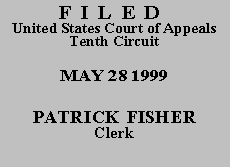

| LOUIE WESLEY CRANDALL,
Petitioner-Appellant, v. SUMNER COUNTY DISTRICT ATTORNEY; SUMNER COUNTY DISTRICT COURT; STATE OF KANSAS, |
|
Petitioner Louie Wesley Crandall, appearing pro se, seeks a certificate of appealability to appeal the district court's dismissal of his habeas petition for failure to exhaust state court remedies. As Crandall has failed to make a "substantial showing of the denial of a constitutional right," 28 U.S.C. § 2253(c)(2), we deny a certificate of appealability and dismiss the appeal.
In September 1993, Crandall pleaded guilty in Kansas state court to one count of obstruction of an officer's official duty, see Kan. Stat. Ann. § 21-3808(b), and was sentenced to fourteen months' imprisonment. The record reflects no direct appeal from the Kansas sentence. Immediately after sentencing, Crandall was extradited to Missouri where he was convicted of two counts of felony sodomy in Missouri state court and was sentenced to two consecutive thirty-year terms of imprisonment. He is currently serving his Missouri sentence in a Missouri state penitentiary.
In August 1998, Crandall filed a "pro se petition and motion in mandamus" in Kansas federal district court, attacking the validity of his 1993 Kansas guilty plea. He initially named as defendants the Sumner County District Court and the Sumner County District Attorney, but subsequently changed the defendant to the State of Kansas. The federal district court denied mandamus relief, construed the petition as one requesting a writ of habeas corpus, and ordered Crandall to show cause why the petition should not be dismissed for failure to exhaust state court remedies, as required under 28 U.S.C. § 2254(b)(1). After Crandall failed to demonstrate compliance with § 2254(b)(1), the court dismissed his petition without prejudice.
The district court stated Kansas authorities had lodged a detainer against Crandall to ensure he returned to serve his Kansas sentence after completion of his Missouri sentence. Crandall is thus entitled to seek habeas relief on his Kansas sentence. See Maleng v. Cook, 490 U.S. 488, 493 (1989) (per curiam) (prisoner may attack conviction/sentence for which he is not currently confined but for which he may be subject to future incarceration) (citing Peyton v. Rowe, 391 U.S. 54 (1968)). The fact that Crandall is presently confined in Missouri does not prevent him from challenging his Kansas sentence in Kansas federal court. See Braden v. 30th Judicial Circuit Ct., 410 U.S. 484, 498-99 (1973) (habeas petitioner incarcerated in one state may attack detainer lodged against him by another state in federal court sitting in state lodging the detainer). To do so, Crandall must file a petition naming as respondents the officer having present custody over him (i.e., the warden of the Missouri prison) and the Kansas Attorney General. See Rule 2(b) of Rules Governing Section 2254 Cases in the United States District Courts.
Nevertheless, before Crandall may file a habeas petition in federal court, he must exhaust all available state court remedies or demonstrate circumstances that render such state remedies ineffective. See 28 U.S.C. § 2254(b)(1). Having failed to satisfy either requirement, Crandall's habeas petition is not ripe for review and the district court acted properly in dismissing the petition without prejudice.
We DENY Crandall's application for a certificate of appealability and DISMISS his appeal. The mandate shall issue forthwith.
Entered for the Court
Mary Beck Briscoe
Circuit Judge
*. This order and judgment is not binding precedent, except under the doctrines of law of the case, res judicata, and collateral estoppel. The court generally disfavors the citation of orders and judgments; nevertheless, an order and judgment may be cited under the terms and conditions of 10th Cir. R. 36.3.